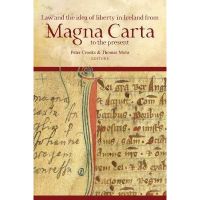
Law and the idea of liberty in Ireland from Magna Carta to the present
This volume is the first to examine the importance of Ireland in the story of Magna Carta's dissemination. Four centuries before Magna Carta crossed the Atlantic, it had already been implanted across the Irish Sea. A version of the charter, issued in November 1216 in the name of the boy-king Henry III, was sent to Ireland, where it became fundamental to the English common law tradition in Ireland that survives to the present. This volume--the proceedings of a conference marking the 800th anniversary of the transmission of Magna Carta to Ireland--explores the paradoxes presented by the reception of Magna Carta into Irish law, above all the contested idea of "liberty" that developed in Ireland. Contributors examine the legal, political, and polemical uses to which Magna Carta was put from the thirteenth century onwards, as well as its twentieth- and twentieth-first century invocations as a living presence in contemporary Irish law. The volume also includes a new edition and translation of the Magna Carta Hibernie ('The Great Charter of Ireland')--an adaptation of the 1216 issue of Magna Carta found in the Red Book of the Irish Exchequer, which was destroyed in 1922.
Peter Crooks; Thomas Mohr
- Four Courts Press
- 9781846827402
- 320 pages
- €55.00
- Hardback
- Ireland
- Legal history








